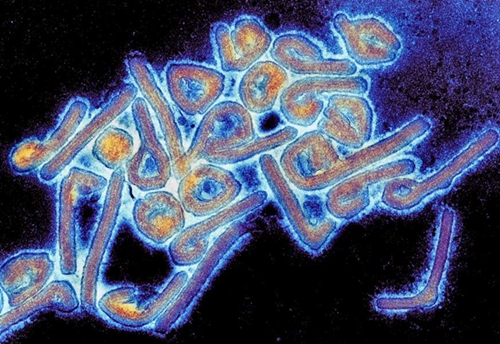6 April 2017. Tests with lab animals show an experimental synthetic antibody protects against deadly Marburg and Ravn viruses as long as 5 days following infections. Results of the study, by researchers from University of Texas Medical Branch in Galveston, Mapp Biopharmaceutical Inc. in San Diego, and Vanderbilt University in Nashville, appear in the 5 April issue of Science Translational Medicine.
Marburg and Ravn viruses are in the same filovirus family as Ebola, with comparable deadly consequences. Symptoms from Marburg virus infections start as headache and malaise, but lead to severe excess bleeding in 5 to 7 days. Outbreaks in Democratic Republic of Congo and Angola between 1998 and 2005 led to fatality rates as high as 80 percent, according to World Health Organization.
The study led by Thomas Geisbert, professor of microbiology and immunology at UTMB, and Larry Zeitlin, president of Mapp Biopharmaceutical, sought to test monoclonal antibodies as a method to protect against these dangerous infections. Monoclonal antibodies are being developed largely as treatments for cancer and autoimmune diseases, where these synthetic proteins are designed for binding to target biomarkers associated with, for example, specific tumors. These antibodies can then act against the tumors by destroying cancer cells, blocking tumor growth, restricting the tumor’s support environment, or blocking immune-system inhibitors.
Mapp Biopharmaceutical develops drugs to prevent or treat infectious diseases, and during the 2014-2016 Ebola outbreak was initially one of the few providers of treatments for the disease, producing human immunoglobulins in tobacco plants. In this study, the research team evaluated monoclonal antibodies synthesized from natural antibodies derived from individuals exposed to Marburg or Ravn viruses and who survived.
The first batch of synthesized antibody candidates were designed to bind to a specific site on the Marburg virus, but at different angles. The researchers tested these candidates with guinea pigs given lethal doses of Marburg or Ravn viruses, then given one of the antibodies 2 days after infections developed. Among the antibodies tested, one code-named MR191-N protected all of the guinea pigs receiving the antibody from further Marburg and Ravn infections. The animals experienced viral symptoms, such as higher body temperature and weight loss, but they all survived.
The team tested MR191-N further in rhesus monkeys, first given lethal doses of Marburg or Ravn viruses, then after 5 days given the candidate antibody. A similar group of monkeys was given only the viruses for comparison. Before given the treatments, all of the animals had high viral loads from infections. All but one of the monkeys treated with MR191-N survived with reduced viral loads, while the untreated monkeys succumbed to the viruses.
Tests with the viruses were conducted at Galveston National Laboratory on the UTMB campus with facilities that meet standards for biosafety level 4, the most secure level of containment, for studies of pathogens causing severe or fatal diseases. It’s the only biosafety level 4 lab on a university campus in the country.
“These findings extend the growing body of evidence,” says Geisbert in a joint statement, “that monoclonal antibodies can provide protection during advanced stages of disease with highly dangerous viruses and could be useful during an epidemic.” Zeitlin adds that Mapp plans, “to advance this product towards human safety testing as quickly as possible.”
More from Science & Enterprise:
- Zika DNA Vaccine Begins Clinical Trial
- CARB-X Commits $48M for Antibiotic Resistance R&D
- Messenger RNA Engineered to Produce Antibodies
- Biotech Companies to Discover Ebola, Zika Vaccines
- Patent Awarded for Whooping Cough Antibodies
* * *


 RSS - Posts
RSS - Posts
You must be logged in to post a comment.